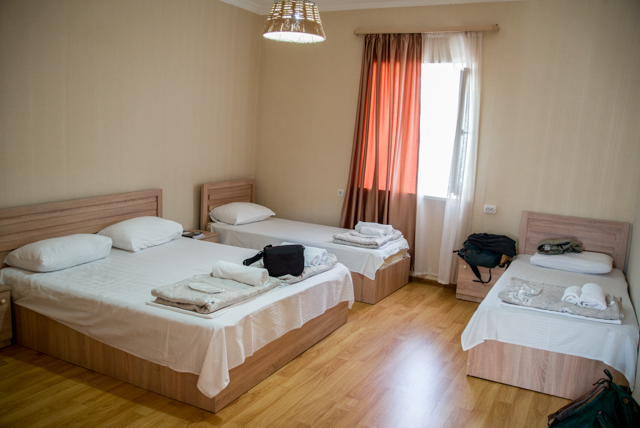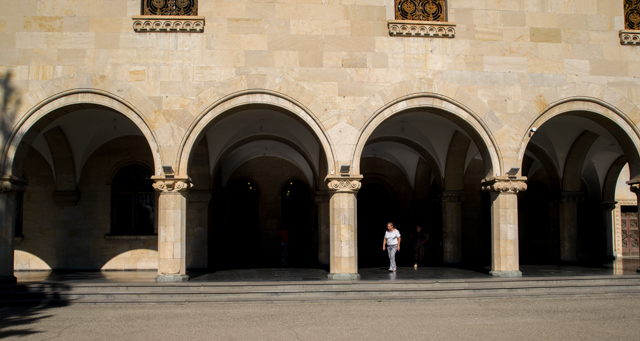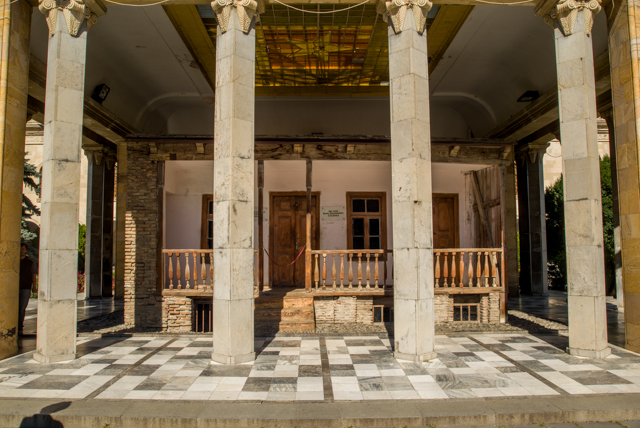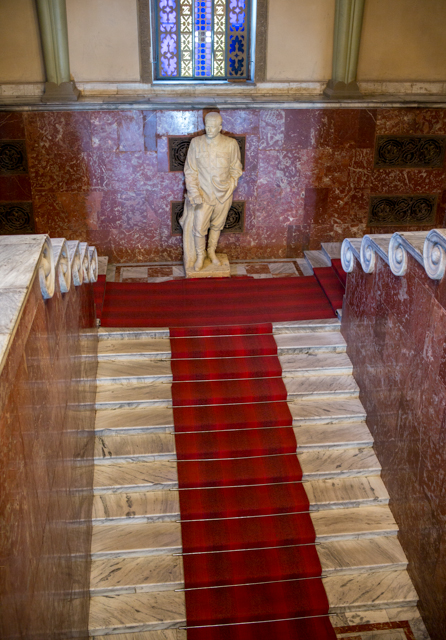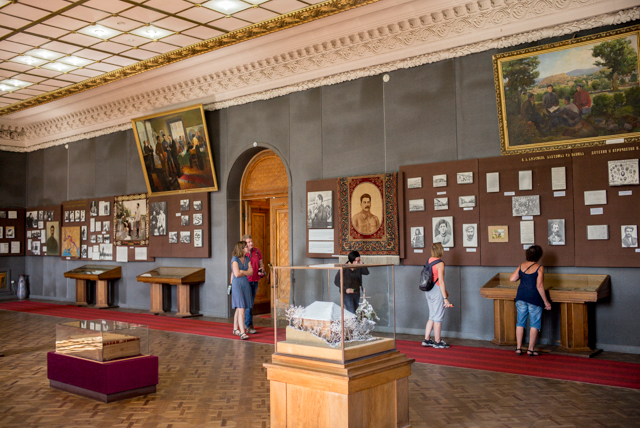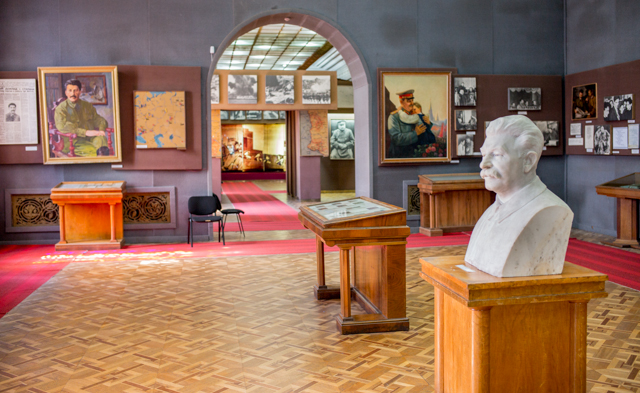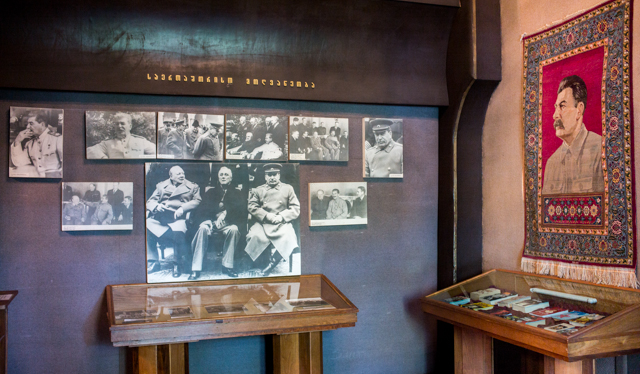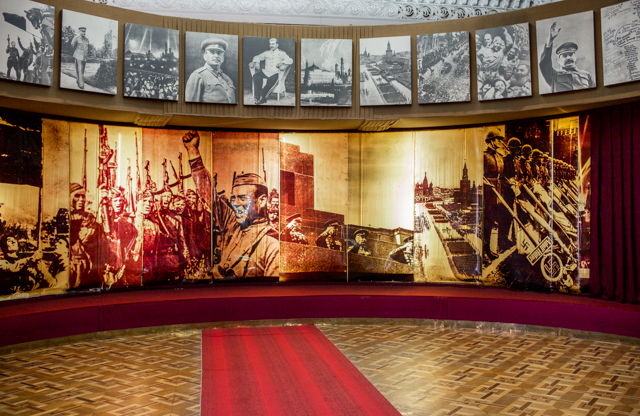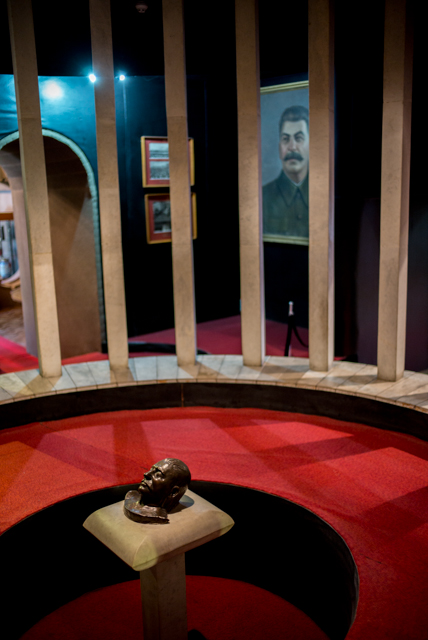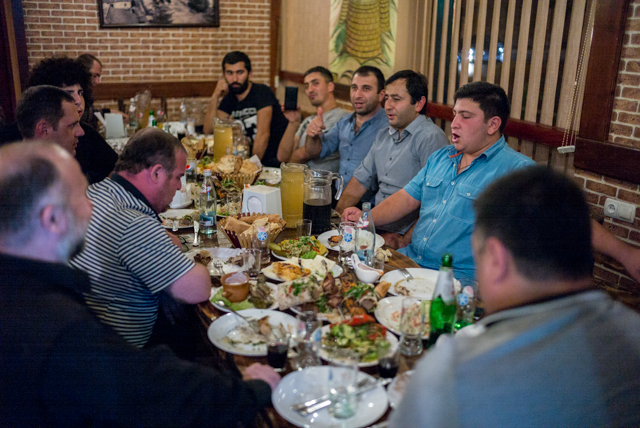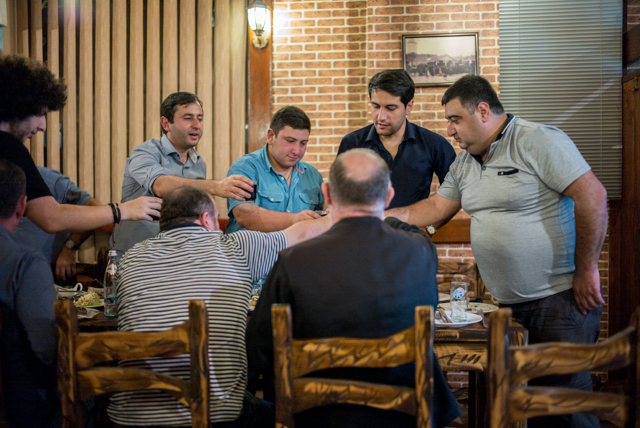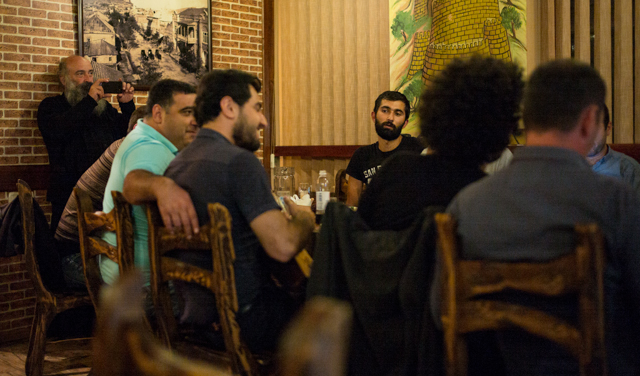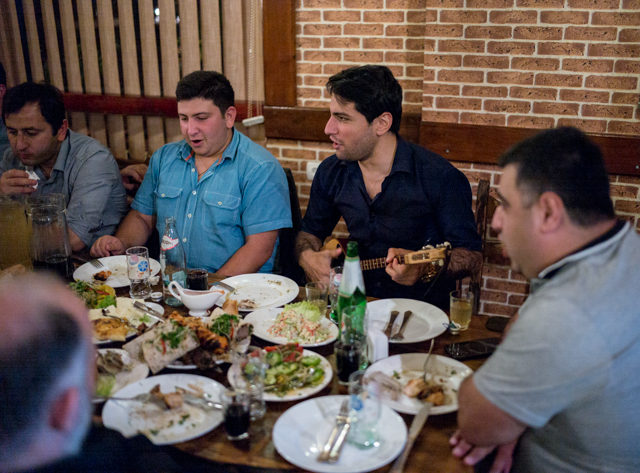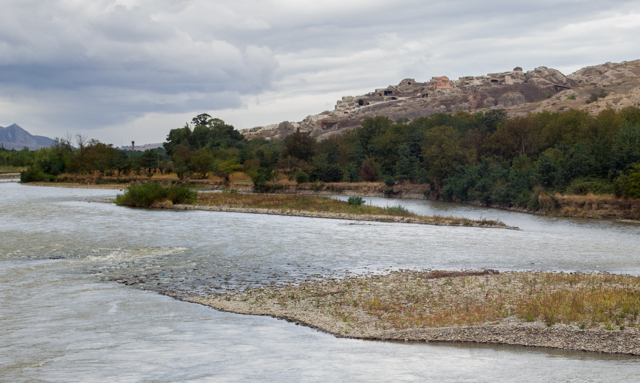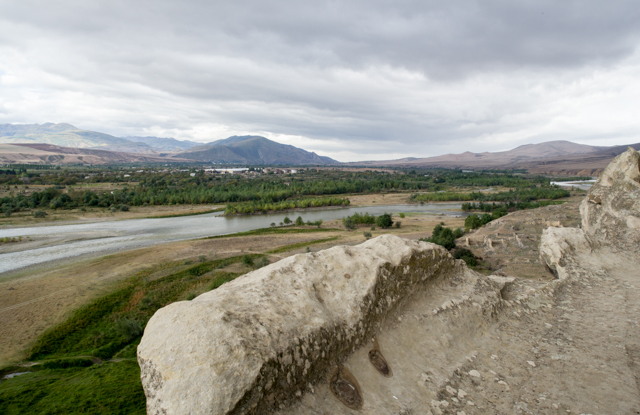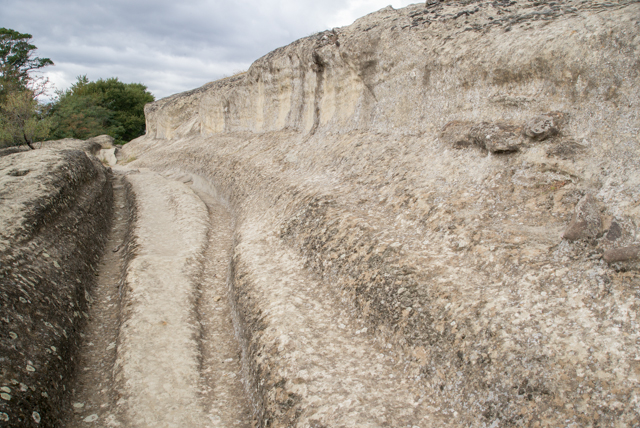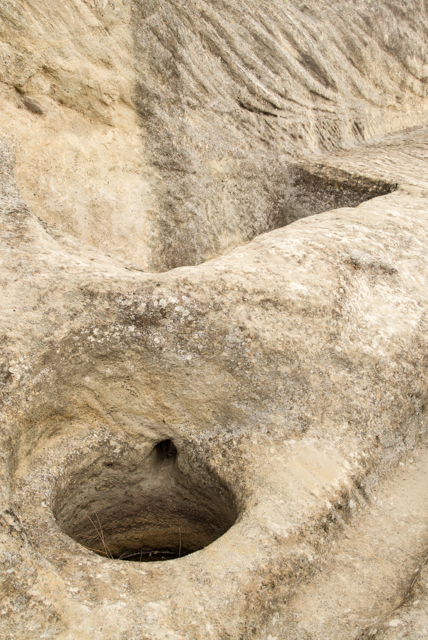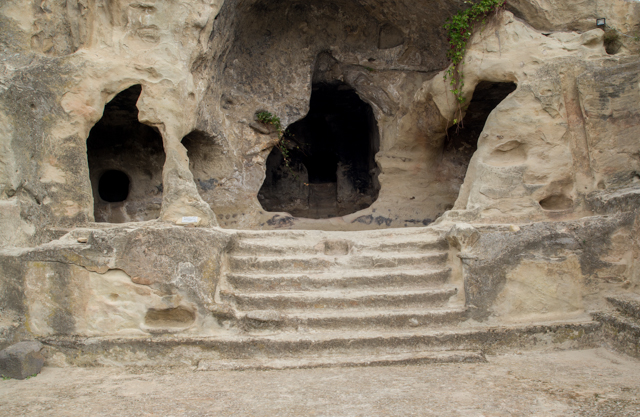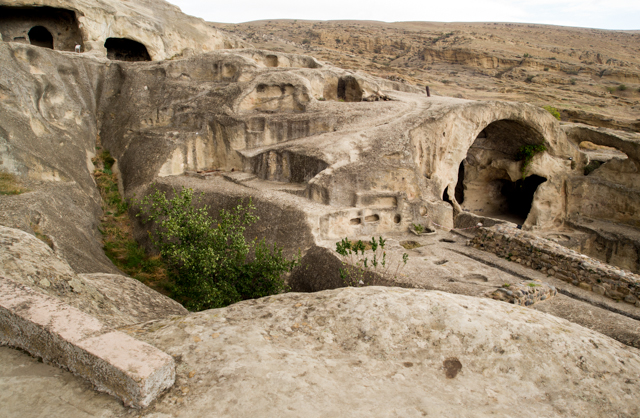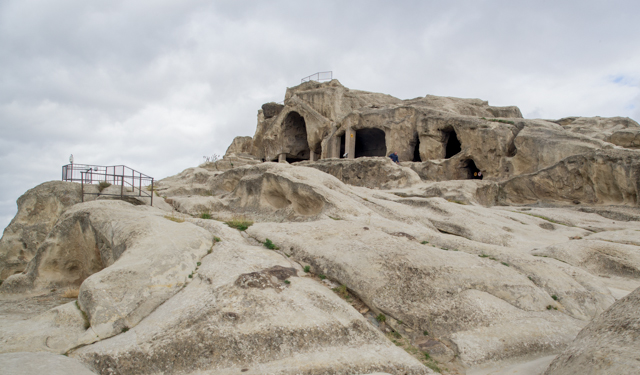Georgia is an ancient land and has been inhabited since time immemorial. So old, indeed, that the Georgians created one of the world's fourteen alphabets as early as the fifth century BCE. Their alphabet comprises 33 symbols which, to one accustomed to the Roman alphabet, look like a collection of random squiggles. Although they are sometimes rather simply transliterated into Roman letters, the squiggles are difficult to memorize, and that can lead to unforeseeable situations when one travels far outside Tbilisi, as we found on arriving in Gori.
Our marshrutka turned off the highway toward Gori a short distance to the north. Reaching the town, it traveled what seemed a circuitous route, stopping a few times to let out a passenger or two. Lacking any map of Gori we had no way to know when we should leave, but for a while the surroundings were clearly residential with none of the stores or other buildings expected in a town's center. Then we passed a large park-like space and onto a street that was lined with shops. Others left the marshrutka but we waited, expecting to arrive at a bus station or square. Soon a miniature square materialized, and the marshrutka stopped there. While waiting for our turn to get up, the man next to me excused himself to pass me while helpfully saying, "Gori" to me.
We pulled our backpacks from the overhead rack and stepped out into the square. A gaggle of taxi drivers immediately swarmed around us. Each one spoke Georgian and absolutely no English. When I spoke the name of our hotel, "Royal House", they looked at me, looked at each other and shrugged and shook their heads. No one understood. Next I brought out my mobile phone, and showed them the hotel reservation. They looked at me, looked at each other and shook their heads. No one understood. None could read the Roman letters. After a couple of additional tries, the drivers started drifting away.
Only one driver stuck with us. I next brought up the hotel's address on my phone. He couldn't read the Roman letters, of course, but I was able to pronounce the address, and finally he understood that. (The pronunciation of transliterated Georgian is mostly phonetic.) So we piled into his cab, and he quickly delivered us to the hotel. The short ride cost 5 lari, about $1, and I added a handsome tip as reward for his patience. Walking around town later, we discovered that we could easily have walked the short distance to the hotel.
Our room in the small, new hotel was spartan, but very clean and tidy, even with our "luggage" present, and the breakfast was especially good.
Leaving the hotel and being very hungry, we stopped at a sidewalk kiosk, where we managed to order sandwiches despite the language barrier. While eating, a pair of beer-swilling men at a nearby table tried unsuccessfully to engage us in conversation. Then with our hunger pangs gone it was a short walk through a wide park to the Stalin Museum.
Josif Jughashvili, later Joseph Stalin, was born at Gori in 1878. His father was a poor cobbler whose family lived in the single back room of a small brick mud building that has been preserved under a grand stone canopy in front of the museum dedicated the Gori's most (infamous son.
The museum itself is an exercise in hagiographic excess. The large multi-storied stone building is, as Robert D. Kaplan has written, "... generic Communist style: massive white-marble hallways and dark red carpets ...". There are very few small, intimate rooms there. Instead, numerous great halls have their walls lined with photos, paintings and photographs of the man which span his life. The artifacts begin long before the 1917 Russian Revolution, and many early photos show Stalin and his comrades at a time when they plotted their version of the perfect society and instigated many events opposing the Tsarist regime. Later works show Stalin with admiring children, overseeing various construction projects, meeting with world leaders and acting always as politicians are wont to act. While it is true, as the museum shows, that Stalin should receive most of the credit for raising Russia via the Soviet Union from a feudal state of widespread poverty and gross inequality to a 20th century industrial nation, the museum has no mention of the draconian methods that he imposed to continually consolidate his control and which have forever eclipsed his achievement with a far darker reputation for his inhumanity.
Gori's best restaurant, perhaps its only good one, was just a stone's throw from our hotel, and we ate there twice. Our first meal there turned into the most memorable occasion of our entire journey.
The small dark restaurant is furnished with at most a dozen rough plank tables and chairs which border a central aisle. As we took seats at a table along the interior wall, we saw that the only other occupants was a large group of youngish men who had pulled together all the tables opposite us and were in fairly loud conversations that might detract from a peaceful meal. None-the-less, we ordered and after a while our salads arrived and we began to eat.
Suddenly, the young men nearest us began to sing! It was immediately remarkable. They were good! Their voices spanned the male vocal range of bass, baritone tenor and counter-tenor, and the song they sang was slow and haunting in a four-part harmony that they executed flawlessly. It almost sounded ecclesiastical, somewhat like a Gregorian chant but more melodic. When they finished singing one stood up and, holding a small tumbler filled with wine, gave a toast. When he finished his long toast, they all stood up, clinked their wine-filled glasses together and drank. Then they sat down and shortly began again to sing another slow song with tight harmony that was again stunningly beautiful and perfectly rendered. And so it went. A song or two followed by a toast. Then a few songs followed by a toast. When the glasses were empty, they refilled them from one of the several pitchers of wine that were distributed along their tables. When the pitchers became empty, the waitress brought replacements.
The toasting and singing continued intermittently after our main plates arrived and throughout our meal. Rather than detracting from our repast, the singing made it so much more interesting and enjoyable. We finished eating and continued to listen. Then another small group of four men entered the restaurant and to the table in the corner at the end of our side of the aisle. One of the men was clearly an older Orthodox priest who spent a good deal of time standing at the far end of the singers' table and taking photos with his mobile phone.
Our bill arrived but still we sat listening to the singing. Soon we had turned our chairs toward the singing table and settled in for the concert. When next I looked up, the priest approached us carrying two glasses of wine which he gave to while querying, "Ruski?". "No, United States," I replied. He looked quite disappointed and said something while motioning toward the singers. I raised my new glass of wine his way and said, "Thank you very much." Then he went back to his table, unable to have the conversation in Russian that he evidently had hoped to have.
After a while the singers shifted gears. Two, who must be twins, each brought out a small stringed instrument that looked like but is not a balalaika. They began to play what are presumably Georgian folk songs, and this time everyone at the table joined the singing. More singing, more toasts, more singing, more toasts. There was enough wine consumed to make even a mere onlooker dizzy.
The singing eventually came less often though the conversations carried on, and we prepared to leave. We got up and approached the long table and we thanked the singers, shaking hands with as many as easily possible. Getting our possessions and leaving our table, I looked toward the back table where the priest and his friends were sitting. I caught the priest's eye and nodded and bowed slightly in his direction. He was quite pleased by my regard for him.
We savored our lucky experience as walked slowly and carefully back across and then down the street to our hotel with no streetlights to guide us through the dark. We went to sleep with that marvelous singing still fresh in our minds.
The next evening we again walked across the street to that restaurant for our dinner. This time there were no singers lining the tables along the aisle. Instead, we were alone except for a party of diners who were sealed up in a private dining room at the end of the aisle which had escaped our notice on the previous evening. When asked, the waitress told us that the men doing most of the singing were the choir at the local Orthodox church and that those first ecclesiastical-sounding songs were indeed church music. "That explains why the priest was so interested in the music," I thought to myself. Our second meal in the restaurant was again good but much less interesting than the first.
The Mtkvari River flows past Gori in its wide valley between low mountains. A long ridge of volcanic tufa, or rock-hardened volcanic ash protrudes toward the river some 10 km east of the town. This relatively soft type of rock frequently erodes irregularly and is not too difficult to excavate. Thus many tuff locales worldwide have been worked into deep caves where people made their homes. Bandelier National Monument in New Mexico was such a home to Ancient Puebloans, and Cappadocia in Turkey is perhaps the most extensive city of cave-homes where many are carved into pinnacles of tuff created long ago by nearby volcanoes.
The Uplistsikhe cave city on the ridge of tuff near Gori flourished as a political and religious center from about the 6th century BCE until about the first century CE. The high ridge gave the city a commanding view of the Mtkvari valley, and it was easy to defend against hostile invasion which has been a very frequent occurrence in this crossroads region of the world.
The depression above was filled with grapes and the pressed juice ran through the hole into the circular depression as evidence of winemaking at the city.
Some Dwellings
